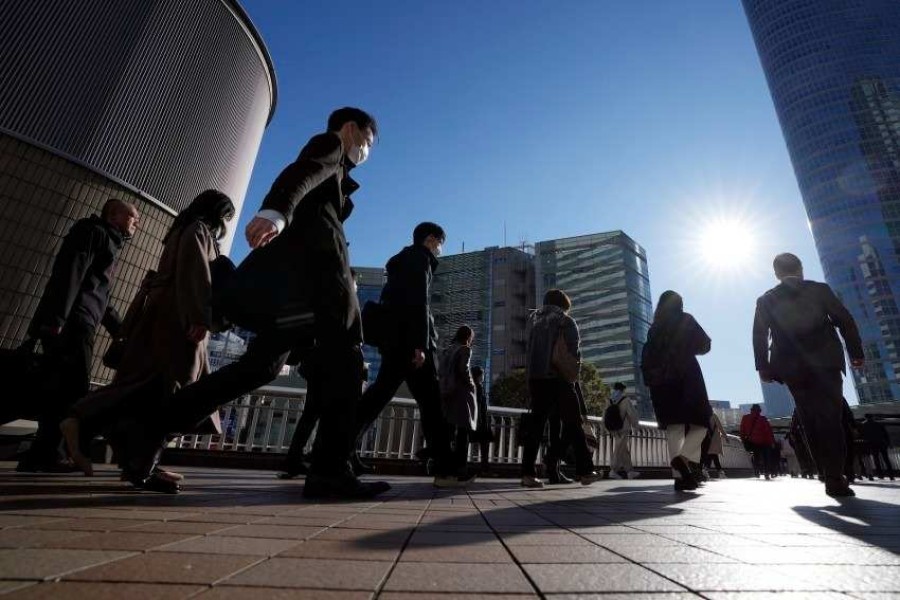Japan, now world's No. 4 economy, on steep road to reverse low growth
18 February, 2024

Japan's economy is facing more headwinds than previously thought, after it dropped to the world's fourth-largest, trailing the United States, China and now Germany, and unexpectedly slipping into recession last year.
With a persistently weak yen blamed for making the size of the economy look smaller in U.S. dollars, the ranking reversal may prove a blip in the end. Still the latest development underscores the fragility of an economy that this year may see the first interest rate hike since 2007.
Germany's nominal gross domestic product stood at $4.46 trillion in 2023, compared with Japan's $4.21 trillion, according to government data released Thursday. Nominal GDP is measured by current prices without adjusting for inflation.
For the final quarter of 2023, Japan's GDP shrank by an annualized real 0.4 percent, contracting for the second straight quarter, thus meeting the definition of a technical recession.
The real challenge for Japan is whether it can reduce its overreliance on monetary and fiscal support extended in times of crisis, and boost its growth potential even amid the rapid graying of society that will inevitably result in more labor shortages, experts said. If that fails, Japan will likely see its economic power further eroded. Even now, India is on course to overtake Japan in 2026 and then become the world's third-largest economy in 2027, according to the International Monetary Fund.
When measured by nominal GDP per capita, South Korea and Taiwan are expected to eclipse Japan in 2031 and 2033, respectively, according to forecasts by the Japan Center for Economic Research.
"It won't be easy to reverse (the declining) trend when efforts to boost productivity have not borne fruit," said Yuichi Kodama, chief economist at Meiji Yasuda Research Institute.
"The current administration is right in investing in people, digital and green transformation to ensure longer-term growth. Japan also needs structural reforms but they require the prime minister to have strong political capital, which looks to be in doubt," Kodama added.
Japan's inflation was far slower than Germany's and the yen's average exchange rate against the U.S. dollar, used by the Japanese government for the GDP comparison, was about 7 percent lower than in 2022.
Japan's fall to fourth place is symbolic, more than a decade after China overtook it to become the world's second-largest economy in 2010. It also came after growing confidence was expressed by the government about the possibility of Japan winning its battle to completely end deflation.
"After a normalization of Japan's monetary policy, the economy should regain its status as the third largest economy," said Martin Schulz, chief economist at Fujitsu Ltd., noting that there is "too large" a gap in the potential of boosting productivity between Germany and Japan, both aging economies.
"For the (Japanese) economy to grow, the two employment groups that have been growing the quickest -- women and older employees -- need to gain higher incomes. This becomes possible with higher productivity," Schulz said.
Japan's potential growth rate has been below 1 percent. As the population is forecast to decrease sharply from the current 124 million in the years to come, labor shortages will be increasingly felt, which economists see as already becoming a bottleneck for the economy.
When labor is in short supply, firms tend to invest in automation and other labor-saving technology while raising pay to secure talent.
The latest economic numbers were perceived as disappointing by analysts who wanted to confirm the strength of domestic demand.
Market expectations have heightened that the Bank of Japan will take a major step away from years of monetary easing that has weakened the yen and some say has helped zombie firms, or unprofitable businesses, stay afloat and reduced the competitiveness of Japan Inc.
In a recent public appearance, BOJ deputy chief Shinichi Uchida touched on the need to improve the "metabolism" of the economy.
"There are various ways to boost metabolism. For instance, it can be done by removing a certain safety net or by raising interest rates. Labor shortages can become a trigger, too," Uchida told a press conference in early February.
Uchida, a key figure behind the central bank's unorthodox policy, reassured markets that monetary conditions will likely remain accommodative.
"In an economy with tight labor markets, higher productivity requires investment into efficiency and digitalization...After decades of expansionary policies, the economy is certainly not well-positioned for such a shift," Schulz at Fujitsu said.
The government, for its part, has vowed to do all it can to achieve more robust wage growth, promote labor market reforms and boost the country's potential growth rate by drawing investment in growth areas including chips and decarbonization among others.
Former BOJ board member Takahide Kiuchi, who is now executive economist at Nomura Research Institute, said the size of an economy should not be all that matters.
Still, the outlook for the economy appears far from optimistic, at least over the short-term.
After a 1.9 percent expansion in 2023, the economy will see its growth sharply slow to 0.3 percent this year, according to Kiuchi.
Source: japantoday.com
